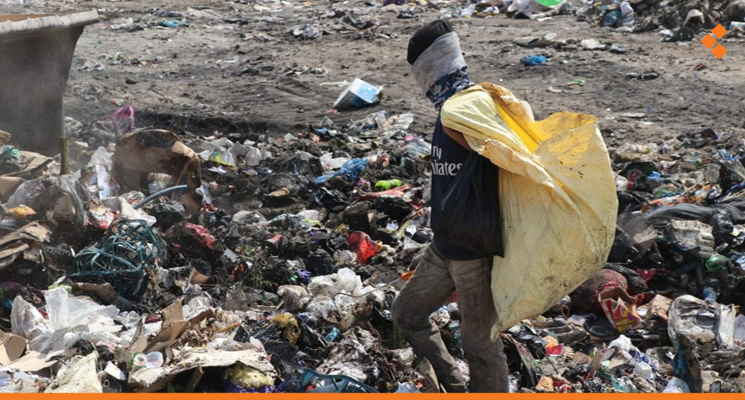In Lattakia, a phenomenon has recently spread of people removing nylon bags from landfills and then grinding, recycling, selling the bags in the market. The phenomenon persists despite the practice’s grave implications for public health and the environment, given that these bags come from landfills.
The illegal nylon recycling process currently taking place in Lattakia depends directly on the “nabashin,” who withdraw everything related to nylon from landfills and collection places and then send them to basic workshops. The workshops then process the bags without washing or sterilizing them. Ultimately, the nylon is treated and then manufactured into new bags.
Strangely enough, this phenomenon — which threatens public health — comes at a time when the COVID-19 virus is spreading. Everyone is focused on preventive measures and tightening health restrictions, primarily those related to hygiene. In these circumstances, using clean nylon bags is a priority and vitally important for health safety.
Read Also: Oil Spill From Power Station Spreads Along Syria Coast
Commenting on this phenomenon, Fida Gharib, the head of the Lattakia City Council’s regulatory department, told Athr Press: “Recycling plastic waste, including nylon bags, poses a real danger if it is conducted without permits and ensuring minimum sanitary conditions.” Gharib stressed that the control department officers monitor shops and workshops and do not tolerate violations. Indeed, they impose regulations on the rights of shop and workshop owners.
Gharib pointed out that the process of recycling plastic waste in this way violates basic sanitary conditions and causes environmental pollution that cannot be halted. The percentage of impurities in poorly recycled waste is large and very high after recycling. “It is noticeable that nylon bags manufactured in this way are not solid,” Gharib said.
The main reason for this problem’s seriousness, according to Gharib, is not knowing the extent of the bag’s cleanliness — given that it originates in landfills. Moreover, the bags are often neither sterilized nor washed. Indeed, the preliminary washing and sterilization processes require licenses that stipulate certain conditions for recycling such materials. Gharib pointed out that the plastic used can contain disease variants that are not effectively killed at the temperature of ovens used by unauthorized factories.
This article was translated and edited by The Syrian Observer. The Syrian Observer has not verified the content of this story. Responsibility for the information and views set out in this article lies entirely with the author.


